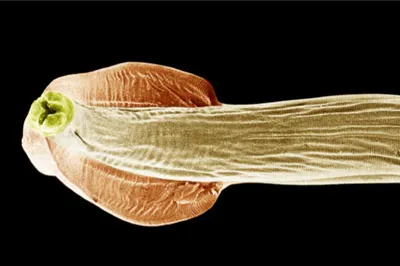It’s a common concern for dog owners: “Can humans get roundworms from a dog?” The answer is a resounding yes, and understanding this zoonotic risk is crucial for protecting both your furry companions and your family’s health. Roundworms are among the most prevalent parasitic worms affecting dogs, and nearly all dogs will encounter them at some point in their lives, particularly during puppyhood. Their adaptable transmission methods make them widespread and challenging to manage.
At Dog Care Story, we are dedicated to providing comprehensive and trustworthy information to pet owners. This article delves into the intricacies of roundworm transmission, its impact on dogs and humans, and essential prevention strategies, drawing upon veterinary expertise to ensure accuracy and helpfulness for our readers.
Understanding How Dogs Contract Roundworms
Dogs can acquire roundworms through several pathways, often starting even before birth. A significant mode of transmission occurs when the mother dog passes the worms to her puppies in utero, while they are still developing within her body.
Post-birth, puppies can become infected by ingesting contaminated soil containing infective roundworm eggs. They can also ingest larval forms of the worm present in their mother’s milk. Furthermore, roundworms can be contracted when a dog preys on or consumes small mammals, such as mice, which harbor roundworm larvae within their tissues. This varied transmission cycle underscores the importance of proactive parasite control.
 Dog with potbelly appearance due to roundworm infection
Dog with potbelly appearance due to roundworm infection
The Impact of Roundworms on Your Canine Companion
Once inside a dog, adult roundworms reside in the intestines, where they feed and reproduce. The severity of infection can range, with many dogs showing no outward signs. However, heavily infected dogs, especially puppies, may exhibit noticeable symptoms. These can include diarrhea, vomiting, unexplained weight loss, a dull and unkempt coat, and a characteristic potbellied appearance, particularly in young dogs. In some cases, if the roundworms migrate to the lungs, a persistent cough may develop.
You might observe adult roundworms in your dog’s vomit or feces. They typically appear as white or light brown, spaghetti-like strands, and can measure several inches in length.
Preventing Roundworms in Your Dog: A Multi-faceted Approach
Given the diverse routes through which dogs can contract roundworms, a comprehensive prevention strategy is paramount. Keeping your dog’s living environment clean is a fundamental step. This includes diligently removing feces from yards and play areas promptly to eliminate potential sources of infective eggs. If your dog has a tendency to hunt or scavenge, it’s advisable to prevent them from consuming wild animals, as these can act as carriers of roundworm larvae.
For puppies, a rigorous deworming schedule is essential. Puppies should be treated at 2, 4, 6, and 8 weeks of age. Following this initial regimen, a monthly preventive treatment is recommended to continue protecting them. Throughout their first year, fecal examinations should be conducted two to four times to monitor for any residual or new infections. For adult dogs, annual or biannual fecal tests are generally advised. Nursing mother dogs should also be kept on a monthly preventive and dewormed alongside their puppies to minimize the risk of transmission.
It’s worth noting that many popular heartworm preventives also offer protection against roundworms. Consulting your veterinarian is key to selecting the most appropriate preventive and treatment options tailored to your dog’s specific needs and lifestyle.
The Zoonotic Risk: Roundworms and Human Health
The concern “Can humans get roundworms from a dog?” is valid because roundworms do pose a significant risk to human health. Transmission to humans typically occurs through accidental ingestion of roundworm eggs. This can happen through direct contact with contaminated soil, such as when children play in areas where dogs have defecated, or when individuals handle soil that may be contaminated without proper hygiene.
Once ingested, roundworm larvae can migrate through the body, potentially causing a range of health issues. These can include ocular (eye) larval migrans, which can lead to vision impairment, and visceral larval migrans, affecting organs like the lungs and liver. Neurological signs have also been reported in humans infected with roundworms.
To mitigate this risk, it’s crucial to maintain good hygiene practices. Children should be supervised and prevented from playing in areas where pet feces may be present. Anyone who has direct contact with soil that could be contaminated by dog or cat feces should wear gloves and wash their hands thoroughly immediately afterward.
For veterinary professionals seeking more in-depth information on ascarids, comprehensive resources are available from organizations like the Companion Animal Parasite Council (CAPC) at https://www.capcvet.org/guidelines/ascarid/. Understanding the full spectrum of parasitic threats and their management is vital for holistic pet care.
While the transmission of ear mites between dogs and humans is generally considered unlikely, it’s always wise to consult your veterinarian if you have specific concerns about potential zoonotic diseases. For further reading on related topics, you might find these articles helpful: can humans get ear mites from their dog, can humans get ear mites from a dog, natural remedies for mange mites in dogs, the best ear mite medicine for dogs, and best over the counter treatment for ear mites in dogs.
Conclusion
The transmission of roundworms from dogs to humans is a serious zoonotic concern that requires diligent prevention and awareness. By understanding how dogs contract these parasites, implementing regular deworming protocols, maintaining a clean environment, and practicing good personal hygiene, pet owners can significantly reduce the risk of infection for both their beloved pets and their families. Always consult with your veterinarian for personalized advice on parasite control and health management for your dog.
If you found this information helpful, explore more expert advice on pet health and care at Dog Care Story!
